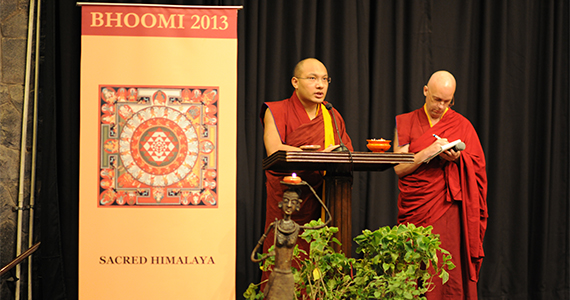3 October 2013 – New Delhi
Reflecting his keen interest and commitment towards environment issues, on 1 October 2013 the Gyalwang Karmapa was chief guest at the 2013 Bhoomi Festival in New Delhi. With the theme of ‘Sacred Himalaya, Abundant Himalaya’, the environment festival was organized by Navdanya, a network of organic producers and seedkeepers spread throughout India, under the leadership of renowned Indian scientist and environmental activist Dr Vandana Shiva.
In his opening speech the Gyalwang Karmapa began by offering his prayers for all those who lost their lives in the recent flood disaster in the Indian Himalayan region of Uttarakhand. He pointed out that in the modern world we are witnessing rapid and destructive environmental changes, and that these changes are due to human activity. He urged those gathered to look deeper into the root causes behind this.
“As all of you know there is no limit to human desires, and yet the support that the natural world gives us does have a limit. We need to recognize that if we were to use everything that we wanted then there’s no way it would work, and there’s no way it would be okay. This is something that we can understand. So we have to think about it – what is it that we actually need? There are many things that we want—we have too many things that we want—yet we do not distinguish between what we want and what we actually need.”
The Gyalwang Karmapa then made a strong call for us to recognize the seriousness of the environmental issues that we face in the world today.
“With us humans, until the terrifying situation is actually right before us it’s difficult for us to get our brains around it and act. For that reason it’s important for us to see that these environmental issues are a great danger. It’s important for us to think about them, and to together take responsibility for them.”
He pointed out that as individuals we can begin by looking at how we each lead our own lives.
“When we think about the environmental difficulties that we face, if we are able to change the way that we approach our own individual lives and the things that are close to our lives, then I think we have hope to be able to effect environmental issues. But if we are unable to change our lives and see how important environmental issues are in our lives, then I think it will be very difficult.”
Dr Vandana Shiva, founder of both Navdanya and the Research Foundation for Science, Technology and Ecology and recipient of numerous international awards, also spoke passionately at the opening session, along with Dr Saamdu Chettri, Director of the Gross National Happiness Centre in Bhutan. Throughout the day various respected academics, politicians, authors and activists also took part in panel discussions on different themes.
In the afternoon session the focus of the festival shifted to the ‘Sacred Feminine’, and the Gyalwang Karmapa returned to once more share his wisdom.
“When we think about the environment, then we talk about mother earth. We don’t talk about father earth too much,” he began. “So with this earth that we have, our mother earth, she is like the theatre in which we can play out all of our pleasures and pains. She is the mother who puts up with everything and no matter what it is that we do, she is still always very loving to all of us.”
“This great earth is actually the embodiment of compassion itself. And yet we find ourselves in a situation where we are tearing down this theatre in which we play out all of our happinesses and all of our pleasures, and we will not be able to experience them. So I think that our mother earth is an example of the sacred feminine.”
The Gyalwang Karmapa ended by pointing to the seeds of love and compassion that are naturally present within each being.
“I feel that all of us have within us these seeds of compassion – they’re present within all of us to some varying degree. This compassion is actually hard-wired into all of us. And yet we are able to turn it off. When we turn it off it’s as if we have no compassion at all. So for that reason it’s important for us to grow these seeds of compassion, so that we can see that we are not separate from other sentient beings, and so that we can develop our love and compassion for others.”
Representatives from different parts of India presented collections of local seeds for the Gyalwang Karmapa’s personal blessing. He then also released two new books, with the first one sharing the theme of the festival, called ‘Bhoomi: Sacred Himalaya, the Divine Feminine’. The second book, called ‘The Sacred Seed’, is edited by Dr Vandana Shiva and the Gyalwang Karmapa himself contributed a chapter on ‘Nurturing the Seed of Compassion.’



